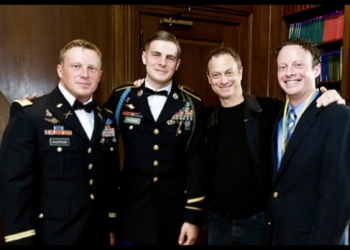More than 200,000 service members leave the military annually, triggering a range of decisions that need to be made — from choosing a location to finding employment, and more. The Department of Defense estimates nearly half of the active-duty force is married, according to a 2020 demographics report, which means this life change requires input from both parties to effectively plan the next chapter.
Two military spouses reflect on how they prepared for their exits from active-duty military life and what they wish they knew sooner.
Plan early for transition
October marked one year since Nichole Nash and her husband, Brian, a retired Air Force lieutenant colonel, transitioned after 21 years of service.
Finding employment was at the top of the Nash family’s list of items to plan for.
“We didn’t need any lapse of paying because even though retirement is there, it’s not enough to live on while still raising kids that are in school,” Nash said.
By planning early, he was able to secure a job as a pilot. But that can look different for some families.
Many veterans struggle with finding employment. According to Pew Research, only one in four veterans has a job lined up and commissioned officers are twice as likely to say they had secured employment after the military than NCOs or enlisted members.
Family and relationship dynamics
Tackling employment felt like hooking the biggest fish, but then, the unexpected came.
“Now you’re in my space,” Nash said.
Retirees often spend more time in the home than during their military career, especially if there’s a delay between jobs — creating friction in some relationships.
“Hence why I went and got a full-time job. Not that we needed it. I needed it to go back to how it was so we would still be civil with each other,” she said.

Amy Pottinger’s experience was similar. Her husband, Patrick, transitioned from active-duty Air Force, piloting an F-22 Raptor, to being an Active Guard Reservist in 2019. After serving for 12 years, she said the change was a lot to take in.
“He’s home all the time, which is definitely an adjustment because we’re both pretty independent people,” she said.
Spouses who’ve had to run their household independently can find it challenging to relinquish control when their spouse wants to help.
“It was me trying to release that and say, ‘It’s OK that he picks that up with the kids because he hasn’t before. We’re finding a new norm,’” Nash said.
She advised couples to vocalize when something bothers them to keep issues from festering.
Health care transition preparation
Whether you’re leaving the military or transitioning to the reserves, Pottinger said you should understand the change in medical care. If you’re living 20 miles or more from a base, you’ll have to find a civilian provider for yourself and your children.
After attending many transition trainings, Nash said some of the basics weren’t clearly communicated.
“They don’t even tell you that you need a retirement ID,” she said. “We had to figure that out on our own.”
Write a list of questions you’d like addressed regarding health care. Include each step from choosing a provider, how dental and vision coverage works, and changing from the Exceptional Family Member Program to an Individualized Education Program for children with special needs.
Protect your mental health
Pottinger said to think about “what you need to be happy in that next stage.” While military families are used to reshuffling, making sure you’re in a healthy headspace for this final transition is vital.
Military OneSource covers free counseling services for families for up to a year after their retirement transition.
Read comments






































